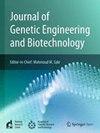印度古吉拉特邦枣椰树性别分子鉴定的PCR研究
IF 2.8
Q3 Biochemistry, Genetics and Molecular Biology
Journal of Genetic Engineering and Biotechnology
Pub Date : 2025-08-15
DOI:10.1016/j.jgeb.2025.100558
引用次数: 0
摘要
枣椰树(Phoenix dactylifera L.)是一种雌雄异株植物,其特征是在不同的植物上有不同的雄性和雌性性器官。枣椰树幼苗性别的准确测定对于选择雌性植株提高果实产量具有至关重要的意义。然而,传统的性别区分技术是劳动密集型的,需要几年的时间。本研究采用聚合酶链式反应(PCR)对枣椰树进行性别鉴定,采用一种针对甘油-3磷酸乙酰转移酶(GPAT3)的雄性特异性引物作为雄性鉴定标记,LOX5.1作为阳性对照,验证扩增过程。GPAT3在男性生育能力中起着关键作用。我们的研究表明,GPAT3扩增只发生在雄性枣椰树样本中,而雌性枣椰树样本中没有GPAT3扩增。因此,存在两个不同的PCR条带表示雄性植物,而单个条带表示雌性植物。为了确定这些引物的有效性,从印度古吉拉特邦的各个地区获得了280个枣椰树样本,并成功地确定了每个样本的性别。这种基于pcr的性别鉴定方法为古吉拉特邦枣椰树的早期性别鉴定提供了一种快速可靠的方法,从而促进了枣椰树的种植实践和果实产量的提高。本文章由计算机程序翻译,如有差异,请以英文原文为准。
Molecular identification of sex in date palm using PCR: a study from Gujarat, India
The date palm (Phoenix dactylifera L.) is a dioecious plant species characterised by separate male and female sex organs on distinct plants. Accurate sex determination of date palm seedlings holds paramount importance in augmenting fruit production by selecting female plants. However, conventional techniques for sex differentiation are labour-intensive and necessitate several years. In this investigation, a sex determination approach for date palm using Polymerase Chain Reaction (PCR), employing a male-specific primer targeting Glycerol-3 Phosphate Acetyltransferase (GPAT3), as the marker for male identification along with LOX5.1 as a positive control to validate the amplification process. GPAT3 is acknowledged for its pivotal role in male fertility. Our work reveals that GPAT3 amplification exclusively transpired in male date palm samples, whereas female samples exhibited no amplification of GPAT3. Consequently, the presence of two distinct PCR bands signifies a male plant, whereas a single band designates a female plant. To ascertain the effectiveness of these primers, 280 date palm samples obtained from various regions of Gujarat, India and successfully ascertained the sex of each specimen. This PCR-based sex determination method provides a swift and dependable means of early-stage sex identification in date palms in Gujarat, thereby facilitating enhanced date palm cultivation practices and heightened fruit production.
求助全文
通过发布文献求助,成功后即可免费获取论文全文。
去求助
来源期刊

Journal of Genetic Engineering and Biotechnology
Biochemistry, Genetics and Molecular Biology-Biotechnology
CiteScore
5.70
自引率
5.70%
发文量
159
审稿时长
16 weeks
期刊介绍:
Journal of genetic engineering and biotechnology is devoted to rapid publication of full-length research papers that leads to significant contribution in advancing knowledge in genetic engineering and biotechnology and provide novel perspectives in this research area. JGEB includes all major themes related to genetic engineering and recombinant DNA. The area of interest of JGEB includes but not restricted to: •Plant genetics •Animal genetics •Bacterial enzymes •Agricultural Biotechnology, •Biochemistry, •Biophysics, •Bioinformatics, •Environmental Biotechnology, •Industrial Biotechnology, •Microbial biotechnology, •Medical Biotechnology, •Bioenergy, Biosafety, •Biosecurity, •Bioethics, •GMOS, •Genomic, •Proteomic JGEB accepts
 求助内容:
求助内容: 应助结果提醒方式:
应助结果提醒方式:


